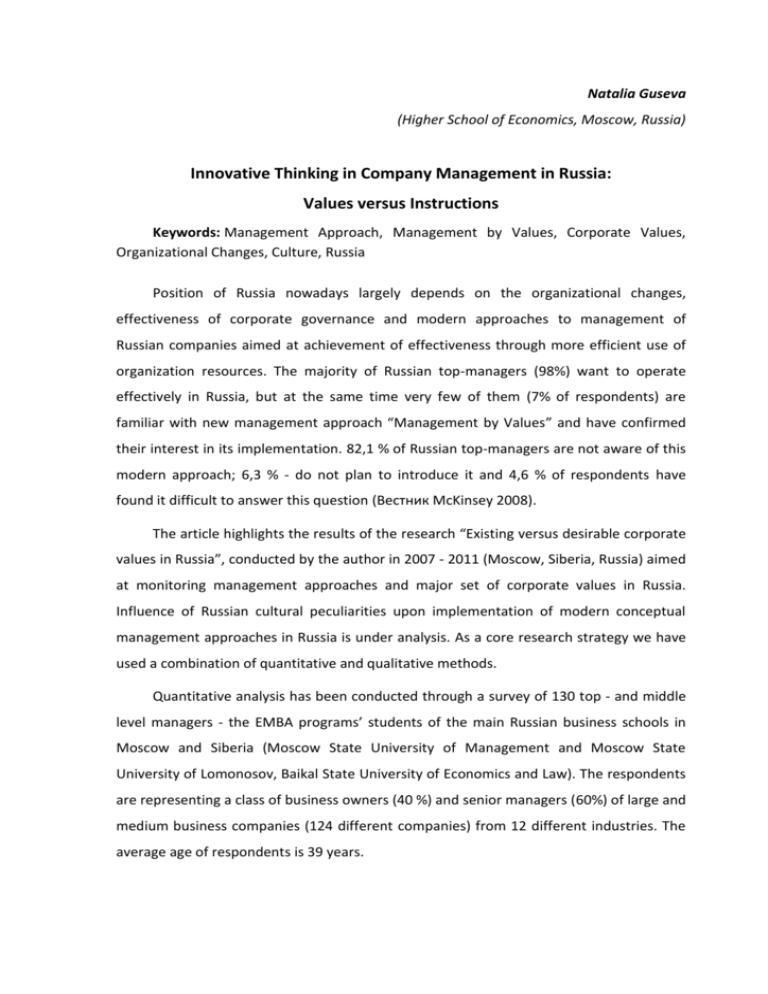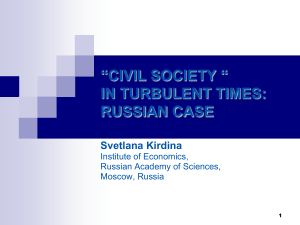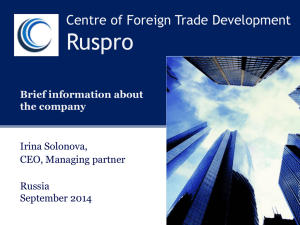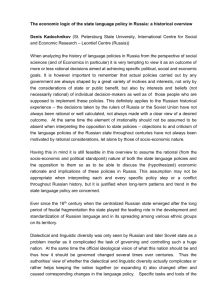Innovative Thinking in Company Management in Russia: Values
advertisement

Natalia Guseva (Higher School of Economics, Moscow, Russia) Innovative Thinking in Company Management in Russia: Values versus Instructions Keywords: Management Approach, Management by Values, Corporate Values, Organizational Changes, Culture, Russia Position of Russia nowadays largely depends on the organizational changes, effectiveness of corporate governance and modern approaches to management of Russian companies aimed at achievement of effectiveness through more efficient use of organization resources. The majority of Russian top-managers (98%) want to operate effectively in Russia, but at the same time very few of them (7% of respondents) are familiar with new management approach “Management by Values” and have confirmed their interest in its implementation. 82,1 % of Russian top-managers are not aware of this modern approach; 6,3 % - do not plan to introduce it and 4,6 % of respondents have found it difficult to answer this question (Вестник McKinsey 2008). The article highlights the results of the research “Existing versus desirable corporate values in Russia”, conducted by the author in 2007 - 2011 (Moscow, Siberia, Russia) aimed at monitoring management approaches and major set of corporate values in Russia. Influence of Russian cultural peculiarities upon implementation of modern conceptual management approaches in Russia is under analysis. As a core research strategy we have used a combination of quantitative and qualitative methods. Quantitative analysis has been conducted through a survey of 130 top - and middle level managers - the ЕМВА programs’ students of the main Russian business schools in Moscow and Siberia (Moscow State University of Management and Moscow State University of Lomonosov, Baikal State University of Economics and Law). The respondents are representing a class of business owners (40 %) and senior managers (60%) of large and medium business companies (124 different companies) from 12 different industries. The average age of respondents is 39 years. Qualitative methods have been presented through multiple comparisons of monographic research schemes with qualitative methods of data gathering: interviews with owners and top-managers (20 in-depth interviews), observation and analysis of company legal documents. In the framework of the survey senior managers were firstly asked to identify five major values, which they want to be shared in their companies and rank them on the basis of their strive for forming strong corporate culture. The main values in which the respondents strongly believe are as follows: trust (most important), loyalty (2 place), motivation (3), employees' participation in the process (4) and creativity (5). All these values are very much in line with modern conceptual management approach «Management by values». But these are «desirable values» of Russian top managers. The second step of this research was the analysis of existing corporate values in Russian companies revealed on the basis of the in-depth interview and survey. The executives have indicated five existing corporate values in their companies. "Quantitative production" is the leader in this list, being considered by the majority of respondents as the main existing corporate value, then goes discipline (2) and motivation (3), followed by loyalty (4) and efficiency (5). These results are very different in comparison with data presented in Table 4 and are mostly in line with management approach “Management by Instructions” based on quantitative production, loyalty, discipline, and conformity. Some of the shared values such as motivation (3) and efficiency (5) testify introduction of approach “Management by results”. In other words, there is a gap between desirable and existing corporate values in Russia. The biggest gap between desirable and existing corporate values in Russia are in trust (-7), employee participation in the process (-7), creativity (-5) and appreciation of individual results (-4). These are the core values of MBV management approach, which are missing in Russian corporate culture. Prevalence of existing corporate values in quantitative production (+6), conformism (+6), rationalization (+6) and strict discipline (+4) - all these are peculiar for the Russian corporate culture and strictly in line with the conceptual approach «Management by instructions». However, this approach was effective in the first half of the ХХ century and does not meet the requirements of dynamically changing environment nowadays. The influence of Russian cultural peculiarities is under analysis and is considered as limits upon implementation of modern conceptual management approaches in Russia. It determines the Russian preference of the rigid authoritative approach based on exact subordination, execution of instructions and desire of employees to be in clear stable situations which is typical characteristic for the approach «Management by Instructions». Finally, the MBV approach consider as a vector of management development for Russian companies, that is based on formation of core corporate values, such as participation and involvement of everyone in the process; transformational leadership; continuous learning; motivation system is based on correlation between remuneration and results of performance; both honesty and fearlessness forming the base of trust and effective interaction; promotion of survival or prosperity of company in the global market. The innovative thinking of corporate management system based on “Management by Values” approach is a management concept of the XXI century, and should be viewed as a source of competitive advantage in Russia.









